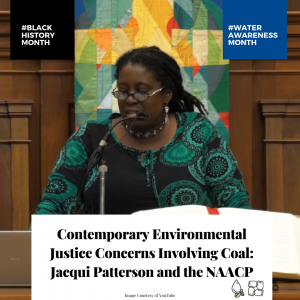
By: Rachel Musetti, General Sustainability Intern, Office of Sustainability Initiatives
On Wednesday, February 17, Emory Climate Talks will host Jacqueline (Jacqui) Patterson at 6 pm EST. Patterson has a long history of working with notable institutions such as ActionAid, where she was a Senior Women’s Rights Policy Analyst; Johns Hopkins University, where she was was an Outreach Project Associate for the Center on Budget and Policy Priorities and a Research Coordinator; IMA Health, where she served as Vice-President of HIV/AIDS Programs; and as a co-founder of and coordinator for Women of Color United. Throughout her impressive career, she fights tirelessly for women’s rights, racial justice, economic justice, and climate justice. Most recently, Jacqui Patterson became the Director of the NAACP Environmental and Climate Justice Program in 2009 and shaped the program to address the variety of ways communities of color and low-income communities are being disproportionately affected by environmental issues (Jacqui Patterson, 2016).
Early on in her role with NAACP, Patterson was a contributing researcher-author to Coal Blooded: Putting Profits Before People along with Kimberly Wasserman of the Little Village Environmental Justice Organization (LVEJO); Amanda Starbuck and Annie Sartor of the Rainforest Action Network; and Judy Hatcher, John Fleming, and Katie Fink of the NAACP. The report was a launching point for the NAACP’s campaign to address “both the urgency and opportunity for community action with respect to coal-fired power plants—an issue at the intersection between climate justice and environmental justice” (Coal Blooded, 2012).
The report showed that “coal plants are single-handedly responsible for a large proportion of toxic emissions that directly poison local communities in the United States” and that these plants are disproportionately affecting communities of color (Coal Blooded, 2012). The report shows a variety of ways in which these operations threaten water sources and watersheds. For example, underground mining consistently creates a depletion of water from the surface, and as a result of mountaintop removal coal mining, over 700 miles of American rivers and streams have become infected with the toxic rubble byproduct. In 2008 the Environmental Protection Agency (EPA) stated that about 136 million tons of coal combustion residuals, known more commonly as CCRs or coal ash, are produced each year. Coal ash contains a range of metals such as arsenic, selenium, cadmium, lead, and mercury, and the EPA noted that as a result of improper protections, coal ash can contaminate groundwater and migrate to drinking water sources (Coal Blooded, 2012).
Here in Georgia, coal ash is a present-day environmental concern. The United States’ largest coal-fired power plant, the Robert W. Scherer Power Plant, is located in Juliette, Georgia (Blau 2020). Many residents of Juliette fear the water nearby, as the sludge from the plant pollutes the streams. This is the case for millions of Georgians. In 2018, EarthJustice published “Georgia at a Crossroads” which reported that all but one of Georgia’s 12 coal-fired power plants have contaminated water sources with at least one known contaminant (EarthJustice, 2018).
Patterson’s work has shown us the pervasive threats that communities of color disproportionately face as a result of their proximity to coal extraction operations and coal-fired power plants, and EarthJustice’s latest report shows that this issue is also of broader environmental and public health concern for Georgians. State lawmakers are taking notice. Bills were introduced last year in the Georgia General Assembly to charge more to dump coal ash in Georgia, which was signed into law, and to restrict future dumping of coal ash in landfills and waterways, which did not pass into law. In the current session, three bills pertaining to coal ash have already been introduced.
Citations
Blau, M. (2020, January 15). ‘I’ve quit drinking The Water’: What It’s like to live next to America’s largest coal plant. Retrieved February 05, 2021, from https://grist.org/energy/ive-quit-drinking-the-water-what-its-like-to-live-next-to-americas-largest-coal-plant/
EarthJustice. (2018, December 13). Georgia at a CrossRoads: A report on coal ash. Retrieved February 05, 2021, from https://earthjustice.org/features/coal-ash-contamination-georgia-groundwater
NAACP. (2016, June 02). Jacqueline Patterson. Retrieved February 05, 2021, from https://www.naacp.org/naacp-leadership/jacqueline-patterson/
NAACP et al. (2012, November 15). Coal Blooded: Putting Profits Before People. Retrieved February 05, 2021, from https://www.naacp.org/wp-content/uploads/2016/04/CoalBlooded.pdf
